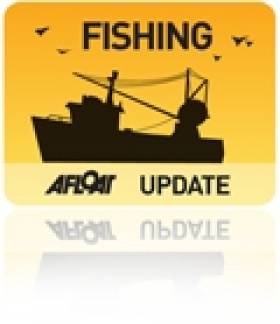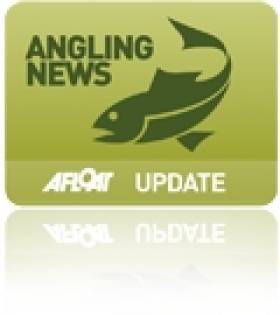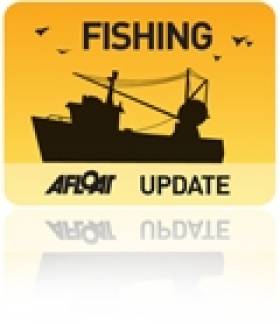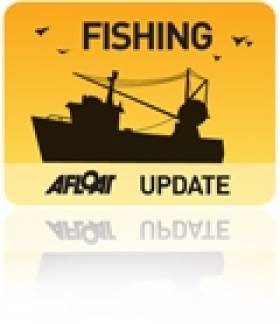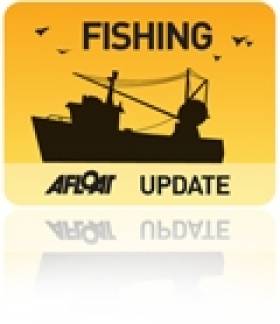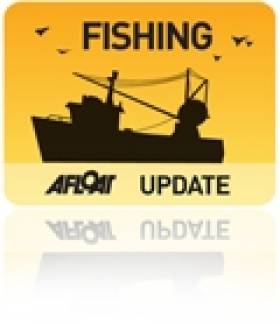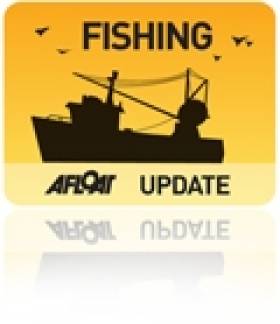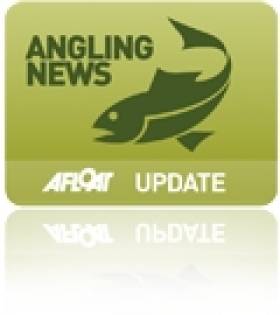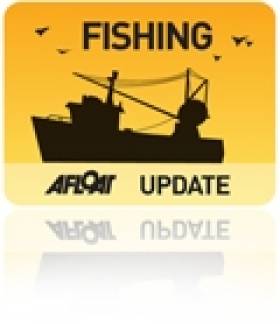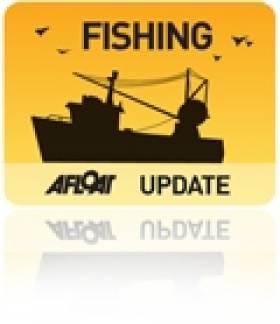Displaying items by tag: fisheries
Marine Minister Announces Expanded & Wide-Ranging €241M Seafood Development Programme To 2020
#Seafood - Marine Minister Simon Coveney today (Friday 27 March) announced plans for a new €241-million development programme for the seafood sector for the period up to 2020.
The new programme will be co-funded by the EU through the European Maritime and Fisheries Fund and is subject to adoption by the European Commission.
A public consultation on the minister’s proposals for the new programme and a strategic environmental assessment were published today, with comments invited by 1 May 2015.
In announcing the new programme, Minister Coveney said: “Our seafood sector is worth in the region of €850 million annually to our economy, with exports growing by 70% since 2009 to €540 million. Seafood is widely recognised as a high growth area of our economy, with the potential to grow to €1 billion by 2020.
"The investment package I am announcing today will be a key element in achievement of that growth potential. It will provide the capital to assist seafood enterprises to sustainably grow their production, add value to our seafood exports and create much needed employment in our coastal communities.”
He went on to say that he "negotiated a doubling for the period to 2020 of the EU seafood development funds to Ireland. Under this programme, €147 million will be provided to Ireland under the European Maritime and Fisheries Fund. Government is providing an additional €94 million in co-funding, demonstrating our commitment to growing and developing the sector.”
The minister said he recognises "at the outset that there will be many views on how these funds would best be invested and on which particular areas should be prioritised.
"Following a detailed process of analysing the investment needs of the sector, I am proposing today that we invest €42 million in implementing the new Common Fisheries Policy, including measures for developing more selective fishing gear, and supporting the new discards ban.
"I am also proposing that we invest a further €6 million to build on the good work that has been ongoing over recent months to revive and sustainably grow our inshore fisheries; €30 million to sustainably develop our aquaculture industry and implement a new national plan for aquaculture that I will be announcing shortly; €12 million to grow the seafood based economies of our coastal communities through community-led fisheries local action aroups; and €41 million to grow markets for our seafood products, develop our seafood processing industry and develop new value added products for those markets.
"I am also making available almost €10 million to support implementation of EU environmental law, to help protect vulnerable habitats and species and ensure that our seafood sector continues to operate and grow in a sustainable manner.”
The Minister concluded by inviting comments on these proposals by 1 May, and said he looks forward "to considering all views and discussing them with stakeholders”.
Inland Fisheries Ireland & Queens University Belfast Share Expertise in Fisheries Research
#fisheries – Inland Fisheries Ireland (IFI) and Queens University Belfast (QUB) jointly sealed a Memorandum of Understanding (MOU) at QUB's Medical Biological Centre earlier this week, on Wednesday 11th of March 2015, expressing their commitment to a continued rich and productive liaison in research and education.
Over a number of years, scientists from QUB and Inland Fisheries Ireland have worked in collaboration to produce high quality research covering an extraordinary range of projects, species and topics. Current areas of joint research include: fish population genetics; aquatic invasive species; and fish telemetry.
Speaking at the announcement, IFI's Head of Research, Dr Cathal Gallagher commented: "IFI and QUB look forward to building on our existing relationship to produce the highest quality research outputs and publications to support the conservation and management on the inland fisheries resource."
The organisations are also seeking to collaborate in encouraging and supporting the development of the next generation of fisheries scientists and technologists.
Dr Cathal Gallagher, continued: "I am confident that the memorandum of understanding signed here today will act as an impetus to move forward with future research collaboration to support our shared goals. I see this collaboration as vital in supporting the development and education of the next generation of scientists into whose hands the future of this resource will be placed.
"I'm also extremely impressed by the expertise and quality of the joint research currently being undertaken and I look forward with anticipation to reviewing the outputs of these projects.'
Professor Christine Maggs, Head of School, School of Biological Sciences, Queen's University Belfast, welcomed the announcement, saying "We are delighted that there is now formal recognition of the long and productive collaboration between QUB and IFI.
"The School's expertise in fish genetics, fish biology and aquatic ecology has been successfully applied to answering significant research questions for the IFI for more than a decade."
Two Men Convicted for Illegal Fishing on Lough Corrib
#illegalfishing – At a sitting of Galway District Court on Tuesday, 3rd February, Judge Denis McLaughlin convicted two men of illegal fishing, and issued fines and costs totalling €1,850. Michael Gannon of Raleigh Row, Galway City, and Brendan Hardiman, with an address at Mace, Corrandulla, Co. Galway were both in court on charges of the illegal use of a net, and illegal possession of a net in contravention of the 1959 Fisheries Act.
Judge McLaughlin heard evidence that on the night of 6th July 2014, fisheries officers on patrol observed the men in a boat on Lough Corrib setting a net. The men returned to shore and left the scene. At approximately 2 am on the 7th July the men returned to the lake, rowed out and retrieved the net. On return to shore they were challenged by the fisheries officers, and under caution they admitted the offences.
Both men were convicted by Judge McLaughlin on one count, with the second charge taken into account. It was acknowledged that on the night both defendants had been co-operative, had accepted responsibility for their actions and were pleading guilty to the charges. The judge heard that Mr. Hardiman had two previous convictions for similar offences, and he fined Mr. Hardiman €750, with €300 costs. Mr. Gannon was fined €500 with €300 costs.
Inland Fisheries Ireland (IFI) has a confidential hotline number to enable members of the general public to report incidents - 1890 34 74 24 or 1890 FISH 24. This phone line is designed to encourage the reporting of incidents of illegal fishing, water pollution and invasive species.
First Ever National Inshore Fisheries Forum Held
#fishermen – The Minister for the Marine, Simon Coveney T.D. today hosted the first meeting of the National Inshore Fisheries Forum (NIFF), bringing together for the first time a network of representatives from the six recently established Regional Inshore Fisheries Forums. The inshore sector (comprising fishing boats of less than 12 metres in overall length) make up more than 80% of the fishing fleet and are predominately active within six nautical miles of the Irish shore.
Speaking ahead of the first NIFF meeting the Minister said: "In May last year I announced a package of measures to support the sustainability and viability of the inshore fisheries sector. I have long been concerned that Ireland's inshore fishermen have been poorly represented in national policy making structures and to address that deficit, and as part of the package of measures, I took the innovative step of setting up of the forum initiative. I am delighted that inshore fishermen are buying into this opportunity to focus the priorities on what is needed to ensure the long term future in their sector. I look forward to appointing the first Chair and Vice-Chair at today's meeting."
The NIFF has been set up to facilitate the development of a coherent inshore sector "voice" by encouraging inshore fishermen to discuss their fishing issues and generate commonly-supported initiatives. A network of Regional Inshore Fisheries Forums (RIFFs), based on and linked to the community-led Fisheries Local Action Groups (FLAGs) around the Irish coast, have nominated delegates to bring forward regional proposals to the NIFF for wider industry discussion. The RIFF members include inshore fishermen, environmental interests, marine leisure, marine tourism and other marine stakeholders. The structures also provide a new opportunity for collaboration between the inshore fishing sector and their communities on sustainable strategies to optimise the income opportunities afforded by the coastal resource.
Michael Keatinge, BIM's Interim CEO and Fisheries Development Director stressed the value of the NIFF to the sector; 'This is a unique opportunity to develop our valuable inshore fishery not just in terms of short term improvements but to ensure the long term sustainability of our stocks which in turn will protect revenue and employment in our fishing reliant coastal communities. Today's meeting is a positive step forward in this regard and the issues discussed including conservation, enforcement and the collation of landings data will enable this industry to be best placed to secure a viable future. I am pleased to say that our industry's commitment to conservation is clear with a phenomenal response to the BIM Lobster V-notching Scheme last year with over 33,000 lobsters v-notched compensating fishermen to the tune of more than €250,000 and we are expecting an even greater response this year. BIM are looking forward to assisting the Minister, the Department and industry to ensure this initiative plays a key role in the development of our inshore fishing sector'
Challenges facing the inshore sector including the reformed CFP and protecting Natura 2000 sites as well as feedback from the recent consultation on a proposed management plan for razor clam fishing in the North Irish Sea were discussed at today's meeting. Other important fisheries for the inshore sector for discussion included lobster, crab and opportunities for diversification to maintain a viable inshore sector.
Coveney Welcomes 'Positive Outcome' at International Fisheries Negotiations In Clonakilty
#ministerforagriculture – The Minister for Agriculture, Food and the Marine, Simon Coveney, T.D., has today welcomed the International Fisheries Agreement signed between the EU and Norway.
The Minister said "the fact that this agreement was concluded in Clonakilty today is very positive for our fishermen targeting these stocks for their businesses in these important fisheries which allows fishermen and fish factories to plan properly in 2015. It is also pleasing that Ireland was able to play a major part as host of these very important negotiations for the EU as a whole".
The negotiations, which began last Monday, were hosted by Ireland on behalf of the European Union at the National Seafood Centre in Clonakilty, Co. Cork and involved delegates from Norway, Sweden, Denmark, Germany, Netherlands, Belgium, France, United Kingdom, Spain, and Portugal.
The negotiations agreed are as follows:
The total allowable catch (TAC) for important stocks that are managed by both EU and Norway.
The sharing of these stocks between EU and Norway.
The transfer of quotas between EU and Norway as part of a balanced deal in the interests of EU and Norwegian fishermen.
The negotiations covered many stocks in both the North Sea, the western waters around Ireland and Scotland and stocks in Norwegian waters.
Minister Coveney also said "I am very pleased that my officials were able to secure a 12% increase in Ireland's share of the important Haddock fishery off Donegal. I also welcome the fact that, subject to confirmation at the Coastal States meeting in London on the 15th of December, we managed to find agreement on an increase in the Blue Whiting Total Allowable Catch for 2015. This fishery is important for our fishermen that target Blue Whiting and for our fish factories that process Irish, Norwegian and Scottish catches of this species for human consumption exports."
The Minister added that "as part of the Blue Whiting package, Ireland was able to reduce the percentage of Blue Whiting TAC, which is transferred by the EU to Norway as part of the overall deal, which will increase the amount of Blue Whiting available to our fishermen."
International Fisheries Negotiations Hosted By Ireland
#fisherynegotiations – Ireland, on behalf of the European Union, is hosting important fisheries negotiations between Norway, Sweden, Denmark, Germany, Netherlands, Belgium, France, United Kingdom, Spain, Portugal and Ireland at the National Seafood Centre in Clonakilty, Co. Cork. These negotiations, on the annual fishing arrangements for 2015 between the European Union (EU) and Norway, commence at the National Seafood Centre in Clonakilty on Monday the 1st of December.
Minister Simon Coveney stated "I very much hope that we will have a successful outcome on the exchange of fishing quotas and access arrangements which will enable the finalisation of quotas for other stocks such as Blue Whiting off the north west of Ireland and the Herring in Norwegian waters which are of major importance to our west coast pelagic fishing fleet and fish processing plants in Donegal. My delegation will be pursuing Ireland's interests to the utmost during the talks."
Over seventy delegates from across Europe and Norway will meet at the National Seafood Centre in Clonakilty for the week long talks.
These negotiations cover a wide range of fish stocks across the North East Atlantic which are jointly managed by and shared between Norway and a range of EU Member States.
Economically, these negotiations are amongst the most important for the EU fishing industry, and this final round will focus on setting Total Allowable Catches for 2015 for a range of stocks, the sharing of these stocks between the parties and substantial quota swops between the EU and Norway as well as access arrangements to each of the respective areas for the parties. The outcome has a very direct effect on the opportunities available to Irish fishermen in 2015.
The Minister went on to say that "Once again, the National Seafood Centre in Clonakilty is the venue of choice to host these important international talks and helps in the overall aim of emphasizing Ireland's positive and proactive role within the European Union. Over seventy international delegates arriving in Clonakilty for a week in December will also bring a welcome boost to the local economy".
Coveney Secures EU Measures Against Russian Ban on Fisheries Imports
#fishing – Minister Simon Coveney TD, at today's EU Fisheries Council, secured the agreement of the Council and the Commission to bank a portion of this year's fishing quotas and transfer them into 2015. This measure will give the fishing industry the option of not fishing part of this year's quota and having it available in 2015. This measure will help mitigate the impact of the Russian ban on the importation of fishery products. The banking option will be applied to the mackerel, horse mackerel and Celtic Sea herring stocks as these are directly impacted by the Russian imports ban. The measure will be introduced shortly on the basis of positive scientific advice that it will not adversely impact on the sustainability of the stocks.
Minister Coveney said "I have listened to our industry and the difficulties those fishing Celtic Sea herring, mackerel and horse mackerel are experiencing because Russia has closed its important market to EU fishery products. The price for herring has dropped significantly for this autumn fishery and I want to give the industry the option of banking part of the quota until prices improve. I today secured the agreement of the Fisheries Council and the Commission to bank 25% of this year's quota until prices improve next year when market conditions have improved. I expect the Commission to receive the required scientific advice that the stocks will not be adversely impacted by this measure over the coming week so that the measures may be adopted in early November. "
Minister Coveney added "I made clear at Council today that we must recognise that we are dealing with a difficult situation for our fishing industry arising from a geo-political issue. We fully support the sanctions decision taken by the EU but must now provide as much support as possible to our fishing industry. The agreement I secured today at Council will give the industry some time and flexibility to find alternative markets while preserving Ireland's quota allocation."
Farmers Play Key Role In Proper Management Of Watercourses
#Angling - Proper management of farm watercourses – whether large rivers or small streams – is critical to ensuring high levels of biodiversity, according to a new leaflet jointly produced by Teagasc and Inland Fisheries Ireland (IFI).
Speaking at the launch of Minding our Watercourses last week, Catherine Keena, countryside management specialist with Teagasc, emphasised the importance of farming in harmony with nature and biodiversity.
“The marketing of Irish farm produce relies on our ‘green’ environmental image," she said. "Watercourses contribute significantly to biodiversity, often being the most valuable habitat on the farm.”
IFI chief executive Dr Ciaran Byrne acknowledged the important role of farmers in the management of watercourses. “Smaller streams, even where no fish are apparent, are critical to the biodiversity of the catchment," he added.
There are 29 species of freshwater fish found in Ireland's waterways, with 14 native species present since the last Ice Age.
The leaflet shows there are different places for different species and life stages within watercourses: salmon and trout spawn on gravels in winter; lamprey spawn on gravels in late spring and summer; coarse fish lay their eggs in weedy parts of the channel; salmon and trout use riffles in the first year and move to deeper water as they grow larger; and juvenile lamprey live buried in silty margins of watercourses.
The new leaflet details best practice management of watercourses. Fencing and providing an alternative source of water is recommended as this avoids damage to the river bank and bed, reduces siltation, prevents fouling with pathogens and prevents the escape of nitrogen and phosphate.
Allowing native trees to grow along watercourses stabilises banks, creates a natural buffer zone, provides valuable habitat for flora and fauna, controls in-stream temperature and weed growth and provides shade and shelter for livestock. Buffer strips alongside watercourses intercept silt, nutrients and improve bank stability.
Farmers are reminded to watch out for and report invasive plant species which smother out smaller native species, which die back to leave large bare areas in winter, resulting in soil erosion.
Fish and their spawning grounds are protected under the Fisheries Acts (1959-2010). In-stream works should not be carried out without prior consultation and the approval of Inland Fisheries Ireland.
If maintaining watercourses, the advice is not to disturb the non-working bank slope; retain vegetation at the water’s edge; leave the working bank slope intact; remove vegetation and silt material from the open channel only; not to remove stone or gravel place spoil along the bank outside the bank-full line, spreading thinly; and leave a buffer of 20 metres at the downside end of a drain to act as a silt trap.
EU Demands Management of Sea Fisheries in 7,000 Square Miles
#seafisheries – The impact of commercial fishing in more than 11,500 square kilometres (7,000 square miles) of English coastal waters is being reviewed to make sure that habitats and species are not damaged by fishing.
This area for further assessment covers about one-third of the sea within six miles of English beaches where there are 89 separate European maritime sites (EMS) protected under European Union law from damage caused by existing or future fishing.
Rob Clark, chief officer of the Southern Inshore Fisheries and Conservation Authority (SIFCA) said today (October 7) that the revised approach to the management of commercial fishing within these maritime sites would ensure EU rules are fully met and inshore fisheries are sustainable.
"Building on existing management measures will ensure that all existing and potential commercial fishing is subject to an assessment of their impact on the sites," he told the annual conference of the Institute of Fisheries Management (IFM) in Liverpool.
Revised management rules would meet EU directives which called for seabed habitats and species in them to be restored to a "favourable conservation status" and for activities which would "significantly disturb or deteriorate them" to be prohibited.
An existing matrix-type approach showing the effect of fishing gears on conservation objectives is being used to enable regulators to decide if priority management measures should be introduced to protect a site, or whether further assessment was necessary.
Fishing activities have been classified as red, amber, green or blue according to the potential or actual impact of fishing gear on a site.
IFCAs have already introduced byelaws restricting potentially damaging fishing from some 5,680 square kilometres of the most important near shore areas classified as red risks, and the Department for Environment, Food and Rural Affairs (Defra) expects measures to address amber risks to be in place by 2016.
Mr. Clark said there was still a significant amount of work to be done by the 10 IFCAs and their partners covering the whole English coast, to deliver the government's commitments for lower risk fishing activities in these areas.
Amber risks would be at sites where there was doubt whether conservation objectives would be achieved because of its sensitivity to a type of fishing. The effect of that activity would need to be assessed at each site affected and management action taken based on the assessment.
BIM Seeks Members for Regional Inshore Fisheries Forums
#inshorefisheries – Following the launch of the National Inshore Fisheries Forum (NIFF) earlier this year by the Minister for Agriculture, Food and Marine, Mr. Simon Coveney T.D. and the recent agreement on the terms of reference for the forum; BIM are now seeking members to take part in the Regional Inshore Fisheries Forums (RIFFs). Each RIFF will feed into the National Inshore Fisheries Forum and will link with the existing infrastructure of the Fisheries Local Action Groups or FLAG's programme. There are six FLAG's established in coastal regions around Ireland.
The RIFFs will comprise of no more than 12 members.
A minimum of 8 members will represent the inshore fisheries sector and will be appointed on the basis of:
their ability to represent the views of the inshore sector
their knowledge of inshore fisheries, fish stocks, and fishing methods, and
their capacity to engage on fisheries management issues.
In addition, the FLAG will aim to ensure that the membership is representative of the FLAG region's geographical coverage and the characteristics of the region's inshore fleet and fisheries. Applicants must demonstrate support within their respective sector for their nomination to a forum. The balance of the membership will include stakeholders from marine sectors other than fisheries, such as seafood processing/sales, marine leisure, marine tourism, environmental NGOs and community organisations.
Should the FLAGs consider a sector or area is lacking in representation the FLAG reserves the right to approach appropriate individuals or organisations to seek members.
If you are interested in applying for membership of the RIFFs, please e-mail Caroline Curraoin in BIM [email protected] or send your application by post to FLAG Co-ordinator, BIM, , P.O. Box 12, Crofton Rd., Dun Laoghaire , Co. Dublin. Full details on the terms of reference for the National Inshore Fisheries Forum are available on www.bim.ie
The closing date for all applications is Friday, 29th August 2014.



























